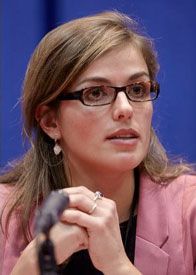Article
Breast Cancer Survivors Who Are Mutation Carriers Are at Increased Risk of Cancer in Other Breast
Author(s):
Carriers of the BRCA1 or BRCA2 mutation are at greater risk for developing a new primary tumor in the contralateral breast compared with noncarriers.

Alexandra van den Broek, MSc
Carriers of the BRCA1 or BRCA2 mutation are at greater risk for developing a new primary tumor in the contralateral breast compared with noncarriers. Within mutation carriers, those younger than age 40 at first diagnosis and those with triple-negative breast cancer (ie, estrogen receptor-negative, progesterone receptor-negative, and HER2-negative), are at an even greater risk of developing contralateral breast cancer, according to the BOSOM study reported at the CTRC-AACR San Antonio Breast Cancer Symposium.
“Our study is the first, as far as we know, to show that among BRCA mutation carriers, specific subgroups with an increased risk for contralateral breast cancer can be identified,” said Alexandra van den Broek, MSc, a doctoral candidate at the Netherlands Cancer Institute in Amsterdam. “Guidelines about treatment decisions and screening for follow-up should take into account these high-risk subgroups to provide even better information and counseling for BRCA1 and BRCA2 mutation carriers.”
The study population was drawn from 5061 women diagnosed with unilateral, invasive breast cancer between 1970 and 2003 at 10 hospitals in the Netherlands; 211 (4%) were identified as carriers of BRCA1 (3%) or BRCA2 (1%) mutations. At a median follow-up of 8.4 years, 8.6% of all participants developed contralateral breast cancer.
The cumulative, overall 10-year risk of developing contralateral breast cancer was 6% in women with no mutations compared with 11.1% in BRCA1 carriers (P<.05 versus those with no mutations) and 20.3% in BRCA2 carriers (P<.01 compared with those with no mutations). First diagnosis of breast cancer in mutation carriers under the age of 40 years was associated with a cumulative 10-year risk of 26% of developing contralateral breast cancer; the cumulative 10-year risk was 11.6% in carriers diagnosed between the ages of 41 and 50 years.
“
Guidelines about treatment decisions and screening for follow-up should take into account these high-risk subgroups to provide even better information and counseling for BRCA1 and BRCA2 mutation carriers. ”
—Alexandra van den Broek, MSc
Mutation carriers with triple-negative breast cancer at first diagnosis had an 18.9% 10-year cumulative risk of developing contralateral breast cancer compared with 11.2% of carriers who did not have triple-negative breast cancer when first diagnosed.
Van den Broek acknowledged that carriers can already be overwhelmed by knowing that they are at greater risk, and those who are breast cancer survivors may feel even more overwhelmed by these new findings related to age and tumor type, especially if they were younger and had triple-negative breast cancer at diagnosis. “But,” she added, “it is crucial to know who is most at risk and by how much.”
The numbers in the study are small, she continued, but if these results are confirmed in larger studies, age criteria, and receptor status of the first breast tumor, may be included in the guidelines for prophylactic measures and screening in the follow-up of BRCA1 and BRCA2 mutations. “If confirmed, it will be possible to personalize guidelines for survivors with these mutations,” she noted.
The next step is to confirm these results in larger studies and examine other factors among mutation carriers that lead to an increased or decreased risk of developing contralateral breast cancer.









